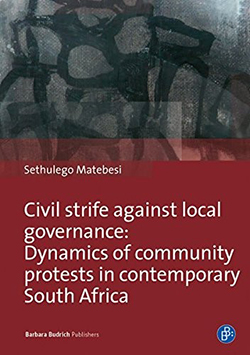Latest News Archive
Please select Category, Year, and then Month to display items
11 September 2024
|
Story Anthony Mthembu
|
Photo Anthony Mthembu and Chelsea Carolus
 From the left: Geraldine Lengau, Senior Officer in the Unit for Institutional Change at the UFS; and Oratile Reina, West College Prime.
From the left: Geraldine Lengau, Senior Officer in the Unit for Institutional Change at the UFS; and Oratile Reina, West College Prime.
As part of the initiatives lined up for College Week, the student leaders of West College at the University of the Free State (UFS) hosted a dialogue that primarily focused on discussing social justice as a value of Vision 130. The dialogue was held at Outeniqua Residence on 3 September 2024 and was well attended by students within West College.
According to Oratile Reina, West College Prime, “the motivation for the dialogue was to prepare newly elected leaders and our college community to align their efforts with Vision 130 – a vision that aims to create a more inclusive, equitable, and socially just environment on campus”. As such, she highlights that the dialogue was an opportunity for leaders to discuss practical strategies for implementing these values in their respective spaces, and to encourage those in West College to become better citizens inside and outside the university.
A conversation on social justice
The dialogue was facilitated by Geraldine Lengau, Senior Officer in the Unit for Institutional Change and Social Justice at the UFS. Lengau touched on several aspects pertaining to the topic of discussion. Firstly, she allowed the audience to give their definition of social justice, especially as students within the institution. In addition, she went on to talk to the audience about sexual assault in the context of social justice. In this instance, Lengau gauged whether the students knew which processes to follow in the event of a sexual assault incident, and whether they were acquainted with the UFS Sexual Harassment, Sexual Misconduct, and Sexual Violence Policy. Furthermore, the audience was given the opportunity to outline what social justice looks like to them in the spaces they occupy, including in their respective faculties, the sports they play, and the leadership structures they form part of. “I was encouraged to see that students take their right to a socially just university in very high regard, and that they were willing to break it down from what Vision 130 proposes, in order to align it with their common understanding,” said Lengau.
As the dialogue concluded, the audience signed a pledge committing to uphold the values of Vision 130. According to Reina, “The pledge represents a promise to take concrete steps towards fostering an inclusive and equitable campus culture. By signing the pledge, the leaders are not only agreeing to embody these principles in their leadership roles but are also holding themselves accountable to their peers and the broader university community.”
Valour inspires book on community protests
2016-10-18

The cover of Dr Sethulego Matebesi’s
book, Civil strife against local governance:
Dynamics of community protests in
contemporary South Africa, that will be
released on 1 November 2016.
Photo: Supplied
Two significant political events: the murder of an unarmed protester, and school children forced out of school sparked the idea to write a book on community protests.
The book, Civil strife against local governance: Dynamics of community protests in contemporary South Africa, by Dr Sethulego Matebesi, gives an academic account of service delivery protests in South Africa.
Research address protests in different communities
“The focus of my book is on community protests directed against municipalities in both predominantly black and white communities,” Dr Matebesi, senior lecturer in the Department of Sociology at the University of the Free State, said. The funding for the book was received from the National Research Foundation and the Erasmus Mundus EU-Saturn Scholarship.
Informs literature on service delivery protests
The struggle against municipalities reaches across geographic and demographic boundaries, but the violent turn of protests in black communities in contrast to white communities has become somewhat of a hegemonic account by scholars. “The book connects the critical issue of community protests with the equally precarious issue of political trust in local government,” Dr Matebesi said. Case studies in the book are indicative of significant shifts in community protest – thus making it timely. Dr Matebesi said: “The book informs the growing literature on community protests and also fills an empirical void by including protesters in residents’ associations.”
“The book is a personal milestone and
the single greatest return on the
sacrifices made over the past 4 years.”
Personal milestone worth the sacrifice
Research was conducted between 2012 and 2015, whereby two case study sites were selected in four provinces to account the different tactics used. “The book is a personal milestone and the single greatest return on the sacrifices made over the past four years,” Dr Matebesi said.